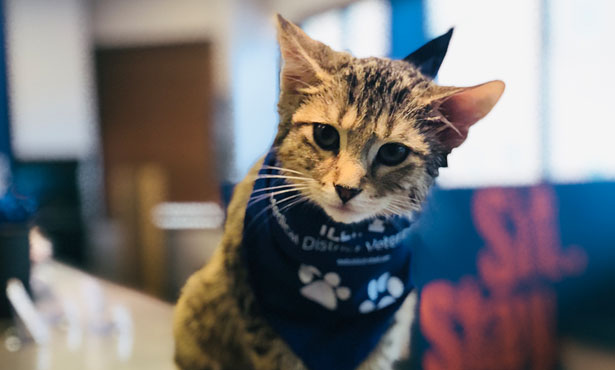National Bring Your Cat to the Vet Day
August 22 is National Bring Your Cat to the Vet Day, which is the purr-fect opportunity to schedule your cat’s routine check-up with us.
Around 83% of cats visit the veterinarian before their first birthday, but more than half don’t return until they become sick or are in pain. When we see our feline patients more regularly, we can positively affect their long-term health by detecting health concerns sooner.
Below are key reasons why it is important to bring your cat for an annual exam:
Cats Age Very Quickly Compared to Humans
A cat reaches the human age of 15 during its first year, and 24 by its second year. Each year after, your cat ages approximately 4 “human years” for every calendar year. Therefore, annual veterinary care is crucial because a lot can happen in 4 years.
Cats Are Masters of Hiding Illness and Pain
Your cat could be developing a health condition long before you notice anything is wrong. You may not recognize some behavior changes as being significant, but subtle or minor changes may help to uncover hidden issues. It is very important for us to see your cats on a regular basis because we are trained to detect a problem before it advances or becomes more difficult to treat.
Obesity
Over half of all cats are overweight or obese. We like to check your cat’s weight at each visit and provide recommendations to help keep your cat at its ideal weight. A few extra pounds can put your cat at risk for conditions such as diabetes, heart, respiratory, joint, and kidney disease.
Dental Disease
Adult cats have 30 teeth, which equates to a lot of dental care! Periodontal disease is considered the most prevalent disease in cats three years of age and older, and often there are no obvious signs of dental disease.
Most cats with dental disease still eat without a noticeable change in appetite, so it is very important perform routine oral examinations before the disease has progressed to the point of obvious illness.
Preventative Care Is Better Than Reactive Care
Information discussed, along with a thorough physical exam, allows us to create a plan to help your cat remain healthy. Regular exams can help avoid medical emergencies since we can often detect conditions or diseases long before they become significant, painful, or more costly to treat.
Please visit www.catvets.com/cat2vetday for more valuable tips on how to reduce stress during veterinary visits and make the visit as pleasant as possible for your cat.
Amber Slaughter, DVM
Medical District Veterinary Clinic
Pictured above: Anastasia, 15 weeks old, recently came to see us for her first vet visit.

